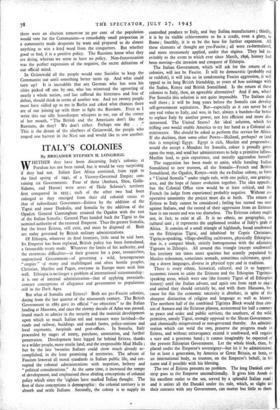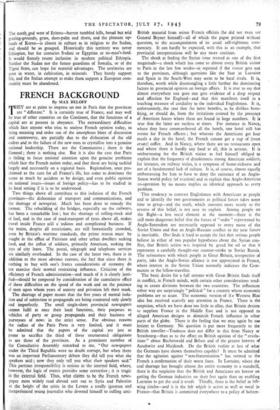ITALY'S COLONIES
By BRIGADIER STEPHEN H. LONGRIGG
WHETHER they have been discussing Italy's colonies at Potsdam has not been stated, but it would be very surprising if they had not. Italian East Africa consisted, from 1936 to the fatal spring of 1941, of a Viceroy-Governed Empire con- taining six Governments. Four of these (Amhara, Shoa, Galla- Sidama, and Harrar) were areas of Haile Selassie's territory first conquered in 1935 ; each of the other two had been enlarged as they emerged from their old colonial status to that of subordinate Governates—Eritrea by the addition of the Tigrai and inner Dankalia, and Somalia by the addition of the Ogaden. General Cunningham retained the Ogaden with the rest of the Italian Somalis : General Platt handed back the Tigrai to the nominal authority of the restored Emperor. Thus the greater Somalia, but the lesser Eritrea, still exist, and must be disposed of. Both are today governed by British military administrations.
Of Ethiopia, whatever its final frontiers, little need be said here. Its Emperor has been replaced, British policy has been formulated, a favourable treaty made. Whatever the limits of his authority, and the enormous difficulties—at their greatest for a poor, resourceless, unpractised Government—of governing a wild, heterogeneous " empire " of many and multilingual and often hostile peoples, Christian, Muslim and Pagan, everyone in Europe must wish him well. Ethiopia is no longer a problem of international statesmanship : it is one of internal administration—that of applying twentieth- century conceptions of allegiance and government to populations still in the Dark Ages.
But what of Somalia and Eritrea? Both are pre-Fascist colonies, dating from the last quarter of the nineteenth century. The British Government in 1885 gave its official " no objection " to the Italian landing at Massawa, and once the siormy decade of Adua was passed, found much to admire in the security and the material development upon which so much Italian toil and treasure were lavished—the roads and railway, buildings and model farms, police-stations and local regiments, hospitals and post-offices. In Somalia, Italy proceeded by stages of treaty, purchase, annexation, and further penetration. Development here lagged far behind Eritrea, thanks to a wilder people, more sterile land, and the irrepressible Mad Mulla ; but by the late 'twenties Italians could show much already ac- complished, in the least promising of territories. The advent of Fascism lowered all moral standards in Italian public life, and cor- rupted the colonial administrations with nepotism, bribery and " political considerations." At the same time, it increased the tempo of development, and emphasised those abiding conceptions of colonial policy which since the 'eighties have marked Italian thought. The first of these conceptions is demographic: the colonial territory is to absorb and settle Italians. Secondly, the colony is to supply its
controlled produce to Italy, and buy Italian. manufactures ; thirdly, it is by its visible achievements to be a credit, even a glory, to
Rome ; fourthly, it is to be the base for further expansion. All these elements of thought are pre-Fascist ; all were re-formulated, and more strenuously applied, under that regime. They led in- evitably to the event to which ever since March, 1896, history had been moving—the invasion and conquest of Ethiopia.
The Italian Government, which will ask for the return of its colonies, will not be Fascist. It will be democratic (probably red
or reddish), it will join us in condemning Fascist aggression, it will appeal to its long British friendship, to years of bon voisinage with the Sudan, Kenya and British Somaliland. Is the return of these colonies to Italy, then, an agreeable alternative? And if not, what?
For Somalia this solution is not quite impossible. The Italians did well there ; it will be long years before the Somalis can develop self-government aspirations. But—especially as it can never be of any real value to Italy, and was, in fact, always a burden—far better to replace Italy by another power, not less efficient and more dis-
interested. The United States? An ideal solution, which for
trifling cost would enable America to try her hand as a Colonial ad- ministrator. She should be asked to perform this service for Africa.
If she declines, then some other Power—Holland, perhaps? or (and this is tempting) Egypt. Egypt is rich, Muslim and progressive ; would she accept a Mandate for Somalia, colour it proudly green upon the map, and send her administrators to help a primitive fellow- Muslim land, to gain experience, and morally aggrandise herself? The suggestion has been made to unite, while handing Italian Somaliland to new trustees, all the Somalis—French and British Somaliland, the Ogaden, Kenya—with the ex-Italian colony, to form a " United Somalia " under single rule, with one policy, one grazing- area, and the hope of future evolution together. The idea appeals ; but the Colonial Office view would be at least critical, and the French (to judge from experience) probably negative. Without co- operative unanimity the project must die at birth. The return of Eritrea to Italy cannot be considered ; feeling has turned too sour against Italians, and the record of their aggression from an Eritrean base is too recent and was too shameless. The Eritrean colony ought not, in fact, to exist at all. It is no ethnic, no geographic, no cultural unit ; it represents the unplanned residue of Italy's grab at Africa. It consists of a small triangle of highlands, based southward on the Ethiopian Tigrai, and inhabited by Coptic Christians, Tigrinya-speaking, village-dwelling cultivators, physically Ethiopian; that is, a compact block, strictly homogeneous with the adjoining Tigreans in Ethiopia. All around this triangle (except southward) lies territory ten times more spacious but scantily populated by Muslim tribesmen, sometimes nomads, sometimes cultivators, speak- ing a dozen languages, diverse in physical type and in tradition.
There is every ethnic, historical, cultural, and (it so happens) economic reason to unite the Eritrean and the Ethiopian Tigrinya- speaking areas, which were one (the historic Tigrai of all Ethiopian history) until the Italian advent, and again one from 1936 to 1941; and united they should certainly be, and with them Massawa, be- cause for this the economic necessity is absolute, in spite of the sharpest distinction of religion and language as well as history. The northern half of the combined Tigrinya Block would thus con- sist of Asmara and the Eritrean plateau, accustomed for half a century to peace and order and public services; the southern, of the wild, primitive, unruly Tigrai, strongly opposed to the Shoan Government, and chronically misgoverned or non-governed thereby. An adminis- tration which can weld the two, preserve the progress made in Eritrea, and without extravagance extend it southward, will require a sure and a generous hand ; it cannot imaginably be expected of
the present Ethiopian Government. Let the whole block, then, be placed under the Emperor's sovereignty—but let it be administered, for at least a generation, by America or Great Britain, or both, or an international body, as trustees, on the Emperor's behalf, in his name and if possible with his blessing.
The rest of Eritrea presents no problem. The long Dankali coast strip goes to the Emperor unconditionally. It gives him Assab as
his excellent outlet to the sea, served by a splendid Italian road ; and it unites all the Danakil under his rule, which, so slight are their contacts with any Government, can matter but little to them.
The north nand west of Eritrea—barren tumbled hills, broad but arid grazing-grounds, grass, dim-palm and thorn, and the pleasant up- lands of Keren—is closest in culture as in religion to the Sudan, and should be so grouped. Historically this territory was never Ethiopian, but for centuries Siidani or Egyptian or no-man's-land. It would fiercely resent inclusion in modern political Ethiopia. Neither the Sudan nor the future guardians of Somalia, or of the Tigrai State, can hope for material advantages. The territories are poor in water, in cultivation, in minerals. They barely support life, and the Italian attempt to make them support a European corn- munity must be abandoned.



























 Previous page
Previous page